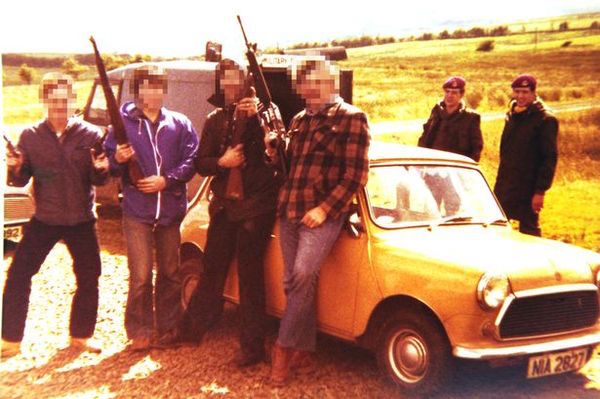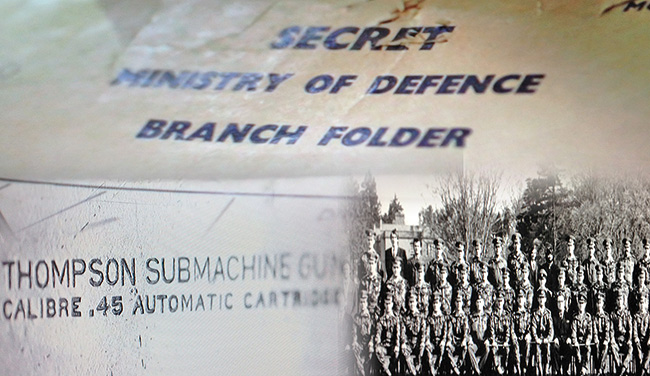2 December 2015
Police to probe British Army's 'Dirty War' death squad – the MRF

MRF – British Army death squad
THE Military Reaction Force – a covert death squad run by the high command by British Army Military Intelligence and under the control of General Sir Harry Tuzo – is being investigated by the PSNI. Police have appealed for information about the activities of the unit in the early 1970s.
The British Army unit – using non-regulation weapons and disguises, including dressing in plainclothes and driving civilian cars – was involved in at least 18 shootings in which nationalist civilians were killed or wounded, some in random attacks. The intention was to goad republicans into a sectarian war by pretending loyalists were behind the attacks.

An Phoblacht and Republican News publicised the activities of the MRF at the time in the 1970s but it wasn't until a BBC TV Panorama exposé in 2013 that the mainstream media took an interest. A police investigation was launched after former soldiers who had served with the MRF told the BBC that they had killed unarmed civilians.
The incidents under investigation are:
- The fatal shooting of 44-year-old Patrick McVeigh and shootings of four other men in Riverdale Park, west Belfast, on 12 May 1972;
- The fatal shooting of 18-year-old Daniel Rooney and shooting of a 18-year-old man in St James's Crescent, west Belfast, on 26 September 1972;
- The shooting of two brothers, aged 19 and 30, in Whiterock Road, west Belfast, on 15 April 1972;
- The shooting of an 18-year-old man in Glen Road, west Belfast, on 6 May 1972;
- The shooting of a 15-year-old boy outside a school disco on Glen Road, west Belfast, on 7 May 1972;
- The shooting of an 18-year-old man in the Slievegallion area of west Belfast on 12 May 1972;
- The shooting at a 34-year-old man in Silvio Street, north Belfast, on 26 May 1972;
- The shooting of four men in Glen Road, west Belfast, on 22 June 1972;
- An incident during which a white Austin Morris vehicle was shot at in Kashmir Road, west Belfast, on 9 May 1972.
The new PSNI investigation is based on the BBC programme broadcast in November 2013, Britain's Secret Terror Force. Even though members of the unit confessed they were responsible for firing on and killing unarmed civilians, senior PSNI officer Drew Harris, now Assistant Chief Constable, maintained there was no evidence of a crime.
In June of last year, however, just as the families were about to mount a legal challenge and force the PSNI to investigate the claims aired in the programme, it was announced that a senior officer was to review the case.
Now Detective Chief Inspector Peter Montgomery of the PSNI's Legacy Investigation Branch (LIB) is saying his probe is “part of a wider investigation into the activities of the MRF”.
Last year, in the wake of the BBC programme, the North's Attorney General granted fresh inquests into the killings of father of six Patrick McVeigh (44), who was shot from a passing car at Riverdale in West Belfast in May 1972, and 18-year-old Patrick Rooney, shot in September the same year as he walked through the St James's area of the city.
Sinn Féin Justice spokesperson Gerry Kelly said:
“The activities of the MRF were part of Britain's so-called 'Dirty War' in the North so I welcome the investigation but, in the long run, all these legacy issues need to be resolved under a comprehensive agreement.”

'MRF operatives uncovered and executed' – From An Phoblacht/Republican News Archives
PLAINCLOTHES British Army undercover units known as the Military Reaction Force (MRF) began operating in Belfast in 1972.
The main work of the MRF spy network – under the control of General Sir Harry Tuzo and consisting of British soldiers from the Military Intelligence Corps and the SAS – was to gather, collate and analyse intelligence on the Republican Movement and the IRA in particular.
The most spectacular example of an MRF undercover operation was the Four Square Laundry.
The Four Square did business as a real laundry. Laundry vans are usually big so there was a good excuse to have a vehicle capable of holding several men and their equipment. The van toured nationalist areas of Belfast, soliciting custom and making collections and deliveries. The washing was sent out to another laundry on contract.
Intelligence was collected in many ways. The ‘laundry people’ would chat with women and obtain apparently insignificant bits of information which could be of great importance when pieced together. Meanwhile, the two agents hidden under the roof of the van photographed the houses, occupants, streets and vehicles.
Once back from their tour, laundry lists were compared with previous ones concerning a given family. A difference in the size of a man’s shirt could indicate the presence of a second man; a woman whose husband was in jail or had been killed who gave men’s clothes for laundering could inadvertently give away the presence of an IRA Volunteer ‘on the run’. The clothes were also scientifically analysed for traces of blood, gun oil and gunpowder.
The Four Square Laundry was highly sophisticated and it took several months for the IRA’s Intelligence Department to unmask it.
On the morning of 2 October 1972, a laundry van bearing in large green letters the words “Four Square” was driving on its usual round in the Twinbrook area in Belfast. As it drove through Juniper Park, two Volunteers of a special IRA Intelligence unit sprang from a car and machine-gunned the van, killed two British Intelligence officers who were lying under the roof in a compartment specially designed as an observation post. The driver, Sapper Stuart, was also killed.
The IRA had killed three MRF members whose intelligence mission was to collect as much information as possible on republicans and republican sympathisers.
Within hours of the attack on the laundry van, the IRA shot dead two more MRF members who were operating one of a series of massage parlours, the Gemini Health Studios, on the Antrim Road.
The following day, 3 October, the British, realising that their undercover operations were blown, admitted to the death of the van driver and the aim of the operation. They failed, however, to disclose that not one but five MRF soldiers were executed by the IRA on this October day in Belfast.
Follow us on Facebook
An Phoblacht on Twitter
Uncomfortable Conversations

An initiative for dialogue
for reconciliation
— — — — — — —
Contributions from key figures in the churches, academia and wider civic society as well as senior republican figures




